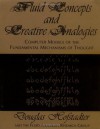251
Followers
4
Following
Manny Rayner's book reviews
I love reviewing books - have been doing it at Goodreads, but considering moving here.
Currently reading
The Greatest Show On Earth: The Evidence For Evolution
R in Action
Fluid Concepts and Creative Analogies
McGee on Food and Cooking: An Encyclopedia of Kitchen Science, History and Culture
Epistemic Dimensions of Personhood
Pattern Recognition and Machine Learning (Information Science and Statistics)
Relativity, Thermodynamics and Cosmology
The Cambridge Handbook of Second Language Acquisition
 I've now read three books about the multiverse in rapid succession: the first two were Rees's Before The Beginning (1996) and Davies's The Goldilocks Enigma (2007). This one came out just a few months ago, so I'm hopefully up to date for the moment.
I've now read three books about the multiverse in rapid succession: the first two were Rees's Before The Beginning (1996) and Davies's The Goldilocks Enigma (2007). This one came out just a few months ago, so I'm hopefully up to date for the moment.Well: I'm starting to feel quite familiar with the arguments, but each book has an interestingly different slant. Rees concentrates on presenting the experimental evidence for the existence of other universes - basically, the physical constants of our own universe appear to be tuned exactly right for life to be possible, it's unlikely that this is just chance, so we're probably one of many universes - and explicitly avoids philosophical speculation. Davies recapitulates Rees's arguments, but then goes overboard on philosophy; whatever he says, it's clear that he very much wants there to be a spiritual dimension to the story. Greene is similar to Davies, but his obsession is with string theory. He's spent his life working on it, and he desperately wants it to be part of the final explanation.
Despite Greene's exaggerated love for all things stringy, I liked this book and found it well worth reading. The author presents nine different theories which in one way or another involve multiple versions of the universe. Most of these I had already seen in Davies, but I found Greene's exposition clearer and more detailed. In particular, I thought his chapter on "inflation" was the best account I had read of this mysterious process, which got our universe started by exponentially blowing it up, in a minute fraction of a second, from the size of a proton to a macroscopic scale. People now seem to understand inflation moderately well, and there are mathematical models which can be checked against the detailed maps of the cosmic background radiation which have been constructed over the last 10 years.
I also thought the chapter on the Many Worlds interpretation of quantum mechanics was excellent; I hadn't understood that it's just a historical accident that the Copenhagen interpretation is the mainstream one. As Greene points out, it's actually more conservative to think of quantum processes as continually splitting off new universes, each of which is equally "real". The Copenhagen interpretation, with its notion of the collapse of the wavefunction, is the one which involves hand-waving and mystical invocations of the privileged role of the "observer". If you just look at the underlying mathematics, the Schrödinger equation, the Many Worlds interpretation is the straightforward way to translate the numbers into words.
As already noted, Greene wants string theory to be in there, so there are chapters on "brane-worlds" (our universe is floating in a higher dimensional space), the "Cosmic Landscape" (there is a multitude of universes reflecting different flavors of string theory) and the Holographic Universe (we are the projection of a lower-dimensional process on a distant boundary surface). Like Davies, he also speculates about the possibility that our universe is a simulation running in some gigantic computer, or that we live in a "Platonic Universe", where mathematical theories exist simply by virtue of being consistent, and there is no other reality.
All of these ideas were fun to read about, but I felt they were somewhat beside the point; I was surprised not to see him focussing on what, at least to me, seems like the obvious account. As he says, the Many Worlds interpretation of quantum mechanics is perfectly respectable, and inflation has accumulated a great deal of credibility as a theory of how the universe got started. Inflation starts at a scale where quantum processes are all-important. We can actually see the fossils of those quantum processes in the unevenness of the background radiation.
Putting those two things together, we already have a multiverse theory that's mainstream to the point of being conservative. The quantum realities which split off during the very early history of the universe will be substantially different from each other. The question is whether they're going to be different enough, since we want them to differ with respect to things including settings of the physical constants. This part is still speculative. But you need it anyway in order to make most of the other theories work, and there seem to be moderately well-worked out accounts of how it could happen. I am sure people must be exploring in this direction.
It sounds incredible when you write it down, but we appear to be on the edge of constructing a coherent scientific theory of Life, The Universe and Everything. I'm really curious to see what happens next.











